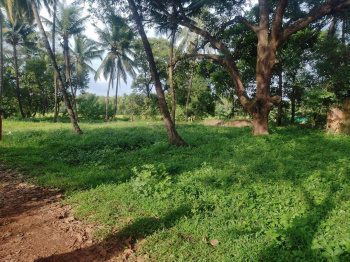The "Goans are selling" narrative is an alibi. To avoid accountability for bad governance and crony capitalism

When Goa complains about the many unwelcome changes taking place here, our benighted political class is often quick to turn around and promptly say: "But who is selling the land?" Is this argument realistic, legit and true, or just an alibi? Is the average Goan really responsible for the mess Goa is in?
This issue is complex and important. It reaches the heart of the debates over Goa's transformation. How we understand it will determine the manner in which we judge Goan society.
From a politician's point of view, the answer is simple. Even simplistic: "The Goans are selling their own land." This argument is often used to deflect blame. It suggests that if Goans are themselves selling land to 'outsiders', then they are complicit in the rapid, often reckless, 'development' the region is seeing.
In such a situation, land speculators, 'outsiders', or governments cannot be blamed alone. On the surface, this may sound like a reasonable point. But, look deeper and it's easy to realise that it oversimplifies the situation. It conveniently ignores a much deeper reality. Context really matters.
As Kenneth Noland, the 20th century American painter, once put it: "For me, context is the key. From that comes the understanding of everything." In other words, context gives meaning to information.
To blame "Goans" as a whole is misleading. Specific individuals have opted to sell their land. This is often the case with those who own, or have inherited, large tracts of prime land. We've seen controversial projects come up in such areas. The heating up of the Goan land market, ever since the CHOGM Retreat and the spurt of tourism in the 1980s (which got more intense with time, and many politicians doubling up as realtors), has made this seem like a tempting deal to some.
Many sellers are absentee landlords, Daizpora Goans, or old elite families. They currently have little day-to-day connection to Goa left. The trajectory of Goan politics, especially since the 1960s, has converted them into a politically-disempowered 'subaltern elite'. One that has the past clout and reputation, but little political influence left.
Average Goans, especially tenants, mundkar families, or low-income locals, often don’t own land to begin with. They have little say in such transactions.
But that is not all. There's another side to this story. Why are these individuals selling out?
Economic pressure, lack of opportunities, the rising cost of living, the threat of losing their lands to encroachers, and the collapse of traditional livelihoods --- farming, fishing, toddy-tapping --- can make it risky to hold on to ancestral properties. In addition, there are also inheritance and partition issues. Families with members abroad often find it easier to sell than manage or develop property jointly.
Hostile land laws further squeeze these sections. From misused mundkar claims to the recent Escheats, Forfeiture and Bona Vacantia Act, a name which some politicians also stumble while pronouncing.
(For the few who might not know by now, The Goa Escheats, Forfeiture and Bona Vacantia Act, 2024, allows the state government to formally assume control --- after a speedy inquiry, public notice, and procedure --- of land, buildings, or other property in Goa when the rightful owner has died without legal heirs, abandoned it or left it unclaimed. This law's title comes from the legal doctrines involving escheat (inheritance lapsing to the State), forfeiture (confiscation when unclaimed), and bona vacantia (ownerless property).)
For many, the decisions they take are based on a lack of choice rather than greed.
Who enables and benefits from this? Often the state apparatus itself. Including politicians, bureaucrats and real estate lobbies. These have a key role in facilitating the process.
Not surprisingly, this is done through a series of routes: (i) weak or manipulated zoning laws (ii) corruption and regulatory loopholes (iii) skewed infrastructure development that raises land prices in targeted areas. Such changes benefit a narrow few. Among them are politically-connected builders, brokers, and 'developers' (both Goan and from beyond).
We need to remind ourselves that the state is supposed to govern for the collective good, not just enable private deals. Blaming individuals for selling land is like blaming citizens for climate change. Yes, in doing so, we can ignore fossil fuel companies. Individual choices do exist, but the system often enables and even rewards harmful behaviour.
The average Goan has little political or economic power to influence large-scale change. They are being displaced and priced-out of their own localities, as noticeable in any area getting gentrified. Take a look at Assagao, Anjuna-Vagator, Moira, Panjim's "Latin Quarter" Fontainhas, Dona Paula or Parra. There is hardly any public consultation on mega projects and land conversions.
So, the "Goans are selling" narrative is an alibi. To avoid accountability for bad governance and crony capitalism. It can divide public opinion and silence protest. Likewise, it is most helpful in shifting the blame from the State to the individual.
Some Goans are indeed selling ancestral land (or even that they don't own). But that does not mean that Goa is selling itself out. Ordinary Goans cannot be held responsible for the destruction of our environment and communities. To blame them ducks an understanding of the systemic forces working on Goa. Above all, it is an abdication of political responsibility.
('Systemic forces' refer to the big, built-in influences in society that quietly reshape how people live and what choices or chances they get. These include the economy, politics, culture or social traditions. This isn't about one person’s decision or a single event. These "rules of the system" affect many people in similar ways, often without them even noticing.)
Who profits from these sales? Who writes the laws? Who decides what gets built and where? Till we answer such questions, blaming the average Goan amounts to building a convenient myth.